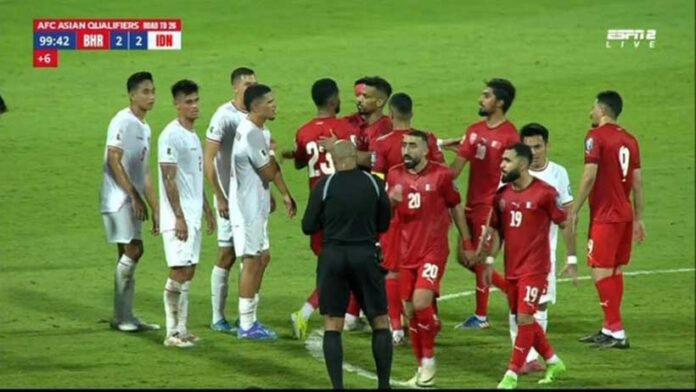On October 10, 2024, a World Cup qualifier match between Indonesia and Bahrain sparked controversy. Indonesia led 2-1 until stoppage time, when Omani referee Ahmed Al-Kaf extended the match beyond the six minutes of extra time initially indicated. (VOI, 2024). In such instances, sports diplomacy plays a critical role in managing public dissatisfaction and preventing diplomatic tensions, while also ensuring that conflicts are addressed through formal and constructive channels. In the Indonesia vs Bahrain match, Al-Kaf’s decision sparked widespread anger among Indonesian fans, as the additional time allowed Bahrain to equalize. Many fans believed the referee had deliberately prolonged the match to benefit Bahrain, leading to accusations of biased officiating (CNA, 2024; VOI, 2024). The outrage was immediate and widespread, particularly on social media, where Indonesian netizens inundated Bahrain’s Football Federation with accusations of corruption and manipulation.
The Role of Sports Diplomacy
In the face of such public uproar, sports diplomacy emerges as a vital tool for managing these sensitive situations. Sports diplomacy serves as a way for nations to build international reputations and maintain positive relationships. For Indonesia, which enjoys a stronger global standing in sports like badminton rather than football, the use of diplomatic channels becomes crucial in voicing concerns effectively. Public protests, if not tempered with formal diplomatic efforts, could escalate unnecessary tension between the two countries (Murray, 2013; CNA, 2024).
As of mid-October 2024, the Indonesian Football Association (PSSI) has formally submitted a protest letter to both FIFA and the Asian Football Confederation (AFC) regarding the controversial refereeing in the October 10 World Cup qualifier match between Indonesia and Bahrain. PSSI’s complaint focuses on the referee Ahmed Al-Kaf’s decision to extend stoppage time beyond the indicated six minutes, allowing Bahrain to equalize in the 99th minute. PSSI argued that the additional time was unjustified and raised concerns that the referee appeared to be waiting for Bahrain to score, which sparked significant outrage from both the players and fans. The protest specifically highlights the referee’s failure to consult the Video Assistant Referee (VAR) system for a possible offside on Bahrain’s equalizing goal, which further intensified the dissatisfaction. In response to these events, Indonesia’s national team manager was given a red card for his protests, and tensions escalated between players and officials post-match.
PSSI’s goal in submitting the protest is to request a review of the officiating decisions and to call attention to what they perceive as a pattern of unfairness in the match. FIFA has not yet released an official response, but the PSSI hopes to bring international attention to the matter through formal channels.
Since Indonesia has already submitted a formal complaint to both FIFA and AFC regarding the referee’s decisions in the Indonesia vs. Bahrain match, the next step in using sports diplomacy should focus on reinforcing the impact of this protest. Indonesia can do this by continuing to engage in ongoing dialogues with FIFA and AFC, not just about this specific match, but by advocating for broader improvements in officiating standards and fairness. This ensures that the country’s complaint is not seen as a singular incident, but as part of a larger movement towards transparency and consistency in football governance.
In parallel, Indonesia should work on maintaining constructive relationships with other member associations within AFC. By building alliances with other countries that have experienced similar grievances regarding officiating, Indonesia can create a collective voice pushing for reform within the sport. This collaboration would demonstrate Indonesia’s leadership in advocating for fairness and equity in football, enhancing its reputation as a country committed to the principles of fair play and integrity. This diplomatic effort, supported by formal actions like the protest, can position Indonesia as a key player in regional sports diplomacy, both strengthening its global football standing and ensuring that future matches are officiated fairly.
A Historical Parallel: The Yonex All England 2021 Incident
A notable example of sports diplomacy mitigating international tensions is the Yonex All England 2021 incident, where Indonesia’s badminton team was forced to withdraw from the prestigious tournament due to strict COVID-19 regulations. Indonesian players, after boarding a flight with someone who tested positive for COVID-19, were removed from the tournament as a precaution. The situation caused a major uproar in Indonesia, with accusations of unfair treatment and biased decision-making. The Indonesian government, through its Ministry of Foreign Affairs, immediately lodged protests with the Badminton World Federation (BWF) and used diplomatic channels to highlight the issue. The government also rallied public support, and prominent figures in Indonesian sports, including athletes and politicians, voiced their dissatisfaction on social media. The strong diplomatic pressure led to BWF reviewing its decision-making processes and acknowledging the need for clearer communication and more consistent enforcement of COVID-19 protocols.
This case demonstrates how sports diplomacy can be an effective tool in addressing perceived injustices while maintaining international relations. By utilizing diplomatic channels, Indonesia was able to address the situation without escalating tensions between itself and the United Kingdom, where the tournament was held. The incident also drew significant international attention to Indonesia’s strong presence in badminton, further solidifying its standing in the sport. Much like the approach Indonesia took with the All England case, sports diplomacy in the Indonesia vs. Bahrain football controversy could not only resolve immediate issues but also lead to long-term improvements in how such disputes are handled in the future, promoting fairness in international sports competitions.
However, in the case of the Indonesia vs Bahrain football match, international support has been more limited, likely due to Indonesia’s lesser influence in the global football arena. This highlights the importance of using diplomatic channels to amplify Indonesia’s concerns, especially in sports where the country holds less global sway. Formal complaints through organizations like MOFA help ensure that national grievances are heard at the highest levels of international governance (Murray, 2018; Pigman, 2013).
The Indonesia vs Bahrain controversy also highlights broader concerns about officiating when Middle Eastern referees oversee matches involving non-Middle Eastern teams. Teams from Japan, Australia, and South Korea have all expressed similar frustrations in past matches, where they perceived referees from the region as favoring Middle Eastern teams. Incidents such as the 2019 Japan vs Qatar AFC Asian Cup final and the 2018 Australia vs Iraq World Cup qualifier serve as precedents, showing how refereeing controversies can ignite international dissatisfaction (Football Asia, 2019; The Guardian, 2018).
In these cases, diplomatic protests through official channels like FIFA and AFC have played a vital role in addressing grievances while avoiding direct conflict with Middle Eastern countries. For Indonesia, engaging in soft sports diplomacy will be crucial to ensuring that the controversy surrounding the Bahrain match does not strain diplomatic relations or diminish trust in international officiating.
Effective diplomatic management of the Indonesia vs Bahrain controversy is crucial for maintaining stable relations between the two nations. While there is no indication that the incident will lead to a formal diplomatic dispute, unchecked public outrage could potentially escalate tensions. Historically, Indonesia and Bahrain have maintained positive relations, cooperating in areas such as trade and education. To preserve this relationship, it is important for MOFA and the Indonesian embassy in Bahrain to proactively address the issue by filing formal diplomatic notes to FIFA or AFC, ensuring that concerns over officiating are properly acknowledged (Murray, 2013; Pigman, 2014).
Conclusion: Balancing Diplomacy and Public Sentiment
The controversy surrounding the Indonesia vs Bahrain football match underline the importance of sports diplomacy in navigating international incidents. While fan frustration is understandable, diplomatic channels must translate public sentiment into concrete actions that lead to constructive solutions. The Indonesian government, through MOFA and its embassies, should ensure that formal complaints are lodged with relevant sports organizations while preserving diplomatic relations with Bahrain. Furthermore, Indonesia must continue working on enhancing its global football performance and influence. By combining sporting prowess with diplomatic efforts, Indonesia can build a stronger international presence, ensuring its voice is heard both in moments of controversy and as a respected player in the global sports arena.








